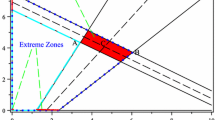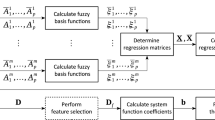Abstract
A method for designing optimal interval type-2 fuzzy logic controllers using evolutionary algorithms is presented in this paper. Interval type-2 fuzzy controllers can outperform conventional type-1 fuzzy controllers when the problem has a high degree of uncertainty. However, designing interval type-2 fuzzy controllers is more difficult because there are more parameters involved. In this paper, interval type-2 fuzzy systems are approximated with the average of two type-1 fuzzy systems, which has been shown to give good results in control if the type-1 fuzzy systems can be obtained appropriately. An evolutionary algorithm is applied to find the optimal interval type-2 fuzzy system as mentioned above. The human evolutionary model is applied for optimizing the interval type-2 fuzzy controller for a particular non-linear plant and results are compared against an optimal type-1 fuzzy controller. A comparative study of simulation results of the type-2 and type-1 fuzzy controllers, under different noise levels, is also presented. Simulation results show that interval type-2 fuzzy controllers obtained with the evolutionary algorithm outperform type-1 fuzzy controllers.

















Similar content being viewed by others
References
Castillo O, Melin P (2001) Soft computing for control of non-linear dynamical systems. Springer, Heidelberg
Castillo O, Melin P (2003) Soft computing and fractal theory for intelligent manufacturing. Springer, Heidelberg
Castillo O, Melin P (2004) A new approach for plant monitoring using type-2 fuzzy logic and fractal theory. Int J Gen Syst 33:305–319
Castillo O, Melin P (2007) Type-2 fuzzy logic: theory and applications. Springer, Heidelberg
Castillo O, Melin P (2008) Intelligent systems with interval type-2 fuzzy logic. Int J Innovat Comput Inf Control 4:771–783
Castro JR, Castillo O, Melin P, Rodriguez-Diaz A (2009) A hybrid learning algorithm for a class of interval type-2 fuzzy neural networks. Inf Sci 179:2175–2193
Deb K (2002) Multi-objective optimization using evolutionary algorithms. Wiley, Great Britain
Deshpande PB, Ash RH (1988) Computer process control with advanced control applications. Instrument Society of America, USA
Hagras HA (2004) Hierarchical type-2 fuzzy logic control architecture for autonomous mobile robots. IEEE Trans Fuzzy Syst 12:524–539
Ingle VK, Proakis JG (2000) Digital signal processing using MATLAB. Brooks/Cole Publishing Company
Jang JSR, Sun CT, Mizutani E (1997) Neuro-fuzzy and soft computing, a computational approach to learning and machine intelligence, Matlab Curriculum Series. Prentice Hall, New Jersey
Karnik NN, Mendel JM (1999) Applications of type-2 fuzzy logic systems to forecasting of time-series. Inf Sci 120:89–111
Karnik NN, Mendel JM (2001a) Operations on type-2 fuzzy sets. Int J Fuzzy Sets Syst 122:327–348
Karnik NN, Mendel JM (2001b) Centroid of a type-2 fuzzy set. Inf Sci 132(1–4):195–220
Karnik NN, Mendel JM, Liang Q (1999) Type-2 fuzzy logic systems. IEEE Trans Fuzzy Syst 7:643–658
Karnik NN, Liang Q, Mendel JM (2001) Type-2 fuzzy logic software. Available online at http://sipi.usc.edu/mendel/software/
Klir GJ, Yuan B (1995) Fuzzy sets and fuzzy logic: theory and applications. Prentice Hall, New York
Kumar P, Bauer P (2009) Progressive design methodology for complex engineering systems based on multiobjective genetic algorithms and linguistic decision making. Soft Comput 13:649–679
Liang Q, Mendel JM (2000) Interval type-2 fuzzy logic systems: theory and design. IEEE Trans Fuzzy Syst 8:535–550
Mamdani EH (1993) Twenty years of fuzzy control: experiences gained and lessons learn. In: Marks RJ (ed) Fuzzy Logic Technology and Applications. IEEE Press, New Jersey
Martinez R, Castillo O, Aguilar LT (2009) Optimization of interval type-2 fuzzy logic controllers for a perturbed autonomous wheeled mobile robot using Genetic Algorithms. Inf Sci 179:2158–2174
Melin P, Castillo O (2002) Intelligent control of non-linear dynamic plants using type-2 fuzzy logic and neural networks. In: Proceedings of the Annual Meeting of the North American Fuzzy Information Processing Society
Melin P, Castillo O (2003) A new method for adaptive model-based control of non-linear plants using type-2 fuzzy logic and neural networks intelligent control of non-linear dynamic plants using type-2 fuzzy logic and neural networks. In: Proceedings of the 12th IEEE conference on fuzzy systems
Melin P, Castillo O (2004) A new method for adaptive control of non-linear plants using type-2 fuzzy logic and neural networks. Int J Gen Syst 33:289–304
Mendel JM (1998) Type-2 fuzzy logic systems: type-reduction. In: Proceedings of IEEE syst., man, cybern. conf., San Diego
Mendel JM (1999) Computing with words, when words can mean different things to different people. In: Int. ICSC Congress Computat. Intell. Methods Applications, Rochester, New York
Mendel JM (2000) Uncertainty, fuzzy logic, and signal processing. Signal Process J 80:913–933
Mendel JM (2001) Uncertain rule-based fuzzy logic systems: introduction and new directions. Prentice Hall, New York
Mendel JM (2005) On a 50% savings in the computation of the centroid of a symmetrical interval type-2 fuzzy set. Inf Sci 172:417–430
Mendel JM, John RI (2002) Type-2 fuzzy sets made simple. IEEE Trans Fuzzy Syst 10:117–127
Mendel JM, Mouzouris GC (1999) Type-2 fuzzy logic systems. IEEE Trans Fuzzy Syst 7:643–658
Mizumoto M, Tanaka K (1976) Some properties of fuzzy sets of type-2. Inf Control 31:312–340
Montiel O, Castillo O, Melin P, Diaz AR, Sepulveda R (2007) Human evolutionary model: a new approach to optimization. Inf Sci 177(10):2075–2098
Ozen T, Garibaldi JM (2003) Investigating adaptation in type-2 fuzzy logic systems applied to umbilical acid-base assessment. In: European symposium on intelligent technologies, hybrid systems and their implementation on smart adaptive systems (EUNITE 2003), Oulu, Finland
Sepulveda R, Castillo O, Melin P, Rodriguez-Diaz A, Montiel O (2007) Experimental study of intelligent controllers under uncertainty using type-1 and type-2 fuzzy logic. Inf Sci 177:2023–2048
Yager RR (1980) Fuzzy subsets of type II in decisions. J Cybern 10:137–159
Zadeh LA (1971) Similarity relations and fuzzy ordering. Inf Sci 3:177–206
Zadeh LA (1973) Outline of a new approach to the analysis of complex systems and decision processes. IEEE Trans Syst Man Cybern 3:28–44
Zadeh LA (1975a) The concept of a linguistic variable and its application to approximate reasoning. Inf Sci 8:43–80
Zadeh LA (1975b) The concept of a linguistic variable and its application to approximate reasoning, Part 1. Inf Sci 8:199–249
Author information
Authors and Affiliations
Corresponding author
Rights and permissions
About this article
Cite this article
Castillo, O., Melin, P., Alanis, A. et al. Optimization of interval type-2 fuzzy logic controllers using evolutionary algorithms. Soft Comput 15, 1145–1160 (2011). https://doi.org/10.1007/s00500-010-0588-9
Published:
Issue Date:
DOI: https://doi.org/10.1007/s00500-010-0588-9




